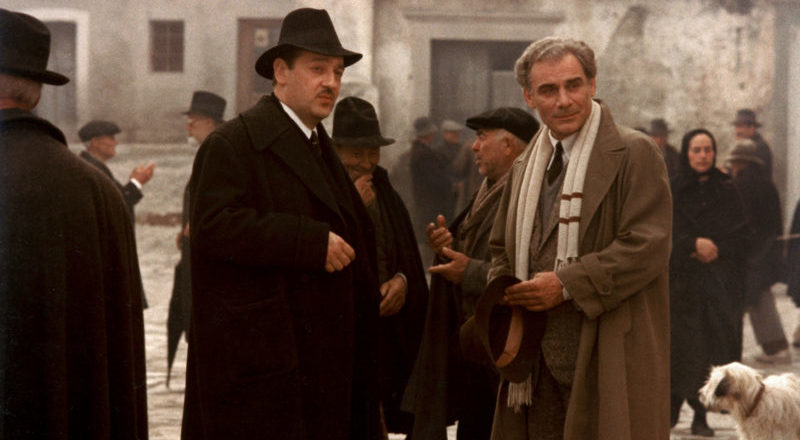REVIEW: ‘Christ Stopped at Eboli’
Photo: Christ Stopped at Eboli stars, from left, Baolo Bonacelli and Gian Maria Volontè. Photo courtesy of Film Forum press site / Provided with permission.
Francesco Rosi’s classic film Christ Stpped at Eboli is a cinematic masterpiece with a towering performance from Gian Maria Volontè, who plays a man punished for his anti-fascist rhetoric and is banished to a small village in the far south of Italy. This central character is actually based on the life experiences of Carlo Levi, the author of the original novel that the film is based on.
For lovers of the 1979 classic, it took 40 years, but finally American audiences will be able to see the uncut version of the 220-minute film. The drama is currently playing New York City’s Film Forum, and this U.S. premiere is certainly the cinematic highlight of the year.
Rosi has the narrative dreamily spill over into four parts, each running approximately one hour and connected by a sad painting of a forlorn child looking at the camera.
After a brief prologue, it’s the 1930s, and the audience first meets Carlo (Volonté) as he takes the train from Turin in the north to the southern reaches of the peninsula. Along his journey, he is reminded of the expression that “Christ stopped at Eboli,” meaning after the train tracks end, another world begins — a world even Jesus Christ forsook.
In the village of Gagliano, in the region of Lucania, Carlo begins to learn about the daily rhythm of the local villagers. He is not allowed to congregate with the other political exiles in the town, so he takes an active, even if unwilling, role in getting to know his new neighbors. He befriends the local priest, a man whose inebriated state often disrupts his homilies. He has interesting conversations with the local mayor, an ardent fascist who inspects Carlo’s letters to his sister back in Turin.
A cleaning lady — the only woman in the village who would enter the house of an unmarried man — provides the movie with a touch of romance. The local doctors connect instantly with Carlo because he too is a certified physician, although one who has never practiced before.
Soon enough, the locals look to Carlo as a friend, confidant and community resource. Husbands employ his help to assist their sick spouses. Neighbors offer him glasses of wine. The priest invites him into his house and talks about books and saints.
As these conversations persist, it becomes obvious that none of the anti-fascist spirit has left Carlo, but he is taking a more absorptive approach to politics. He wants to live with the so-called peasants. He wants to engage with them and learn of their religious ways (even if they don’t align with his own faith). He also enjoys the natural surroundings, which are simultaneously beautiful and lonely, a perfect setting for his reading and thinking.
Carlo utilizes his time of exile in a clever, almost subversive manner. He never loses his sense of politics and, in fact, finds what he has always wanted to prove: real Italians facing hardships because of the corrupt state. His academic theories, which were the talk of the elite back home, are playing out in the dusty streets of this forgotten locale, his new home.
Rosi presents Carlo’s story in a wonderfully matter-of-fact manner. There are many closeups of the protagonist and the many villagers he meets along the way. The rocky hillside where Gagliano is located provides a picturesque backdrop to the subdued narrative, the loneliness seemingly personified by the natural landscape.
Volontè’s performance is layered and quiet. He never once loses his cool or bemoans his political punishment. He is a man whose conscience remains free from the oppressive fascist regime, and he genuinely cares about the villagers he now calls friends. He’s eternally a man making lemonade from lemons.
Irene Papas plays Giulia Venere, the cleaning lady Carlo hires. They learn from each other and have a brief romantic moment, although it’s obvious that both partners understand any lasting relationship would be fleeting. Carlo is an outsider and will be leaving one day, and Giulia has a reputation around town, plus 17 children to take care of.
Rialto Pictures should be commended for their dedication to presenting the full version of the film to American audiences, and Film Forum is clearly the beneficiary of this gargantuan undertaking. It might not seem terribly attractive to sit for 220 minutes, but the joys and impact of Christ Stopped at Eboli are immeasurable and long lasting. This is a deserved classic that is receiving a deserved revival on its 40th anniversary.
By John Soltes / Publisher / John@HollywoodSoapbox.com
Christ Stopped at Eboli (1979), directed by Francesco Rosi and based on the novel by Carlo Levi, stars Gian Maria Volontè, Irene Papas and Baolo Bonacelli. Running time: 220 minutes with intermission. Currently playing the Film Forum in New York City. Click here for more information.

